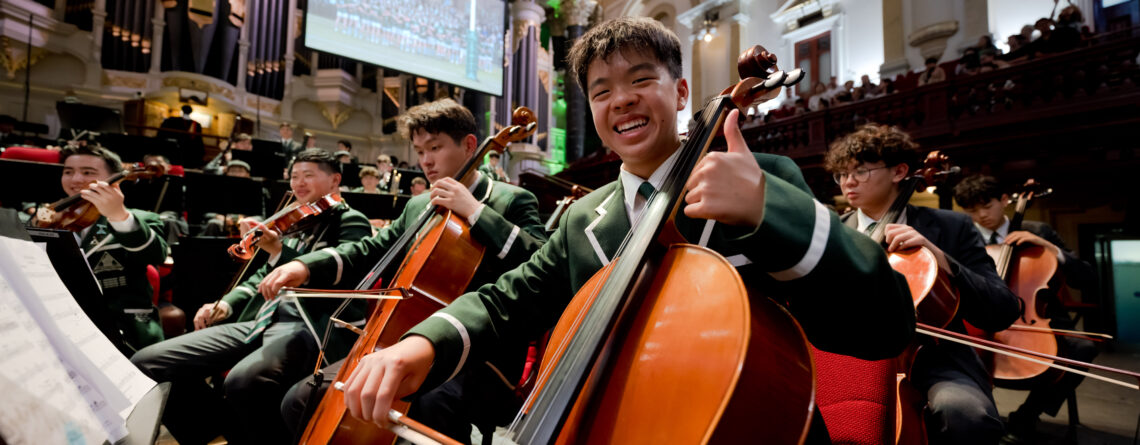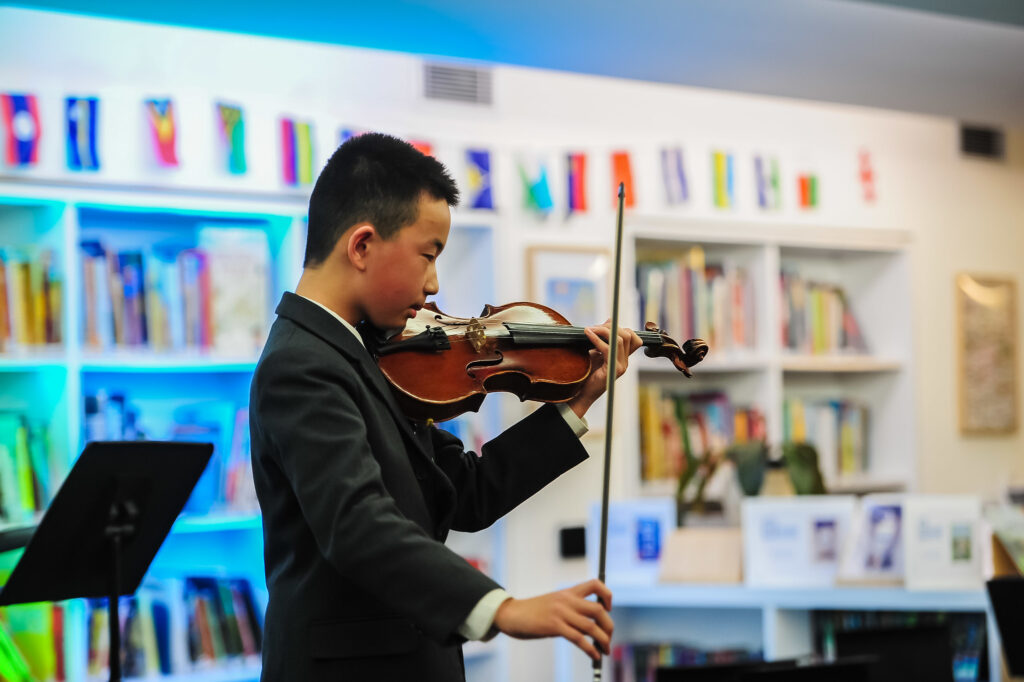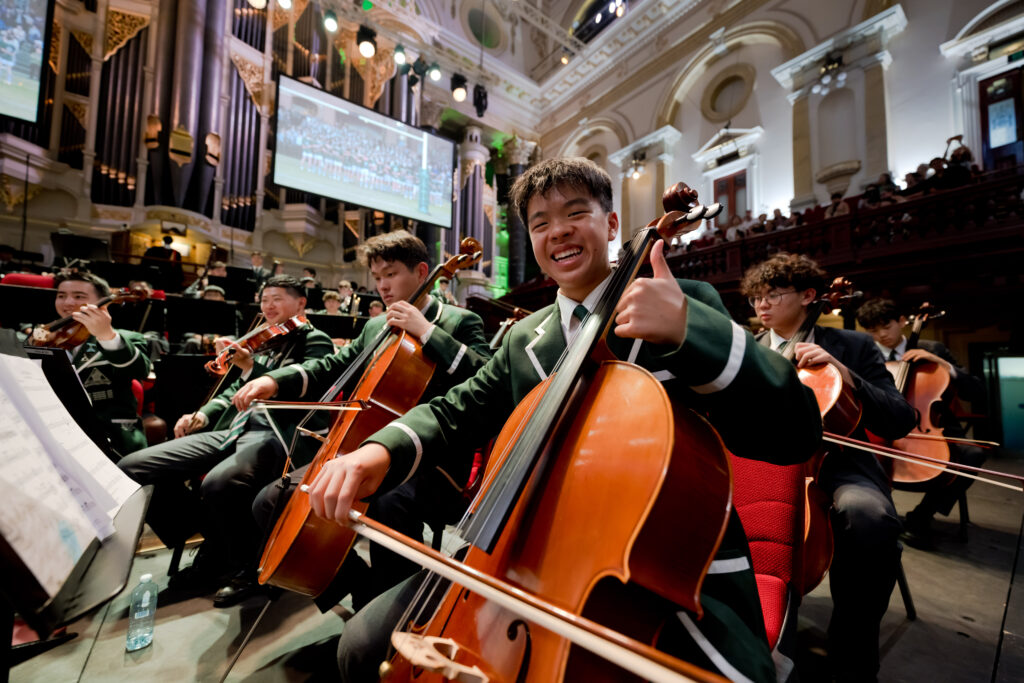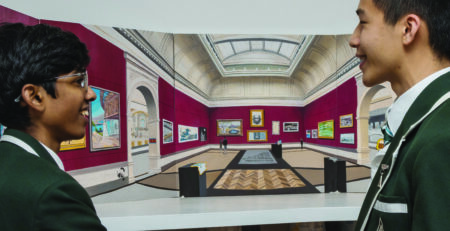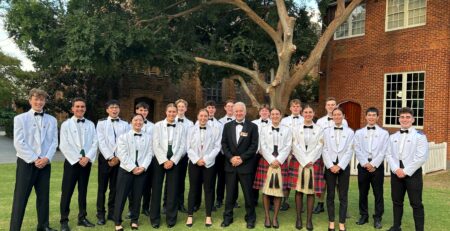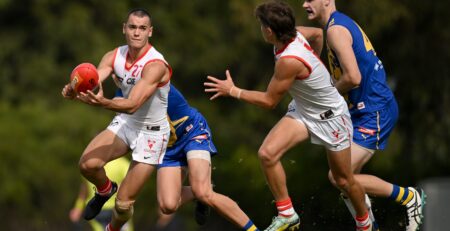Good practice
Tips on making music sweet at home
How hard should music students be pushed to practise? Are you pushing too hard? Or not hard enough?
With some 600 Trinity students engaged in learning musical instruments, and 470 playing in ensembles, these are among the School’s most frequently asked questions as both parents and students seek progress while avoiding what can be a daily source of angst.
The broad answer, according to Director of Co-Curricular Music, Michael McGregor, is that it’s a case of “horses for courses”.
Many Trinity students, for example, love music so much they would happily spend two or three hours every day practising their instruments.
“For the right student there is no such thing as too much practice,” said Dr McGregor. “If they enjoy doing a lot of practice without allowing anything else in their life to suffer, then go for it.”
Other students, though, do not have that level of engagement.
“If a boy who is two or three years into an instrument can’t find half an hour a day, five days a week, to practise, so that he comes to his lesson prepared, then probably something isn’t right,” he said.
It could be that they haven’t found the right instrument for them, or their daily schedule is over-crowded.
Dr McGregor says parents know their children better than anyone, so “they are best placed to work out how to coax them to practise, or indeed to do anything.”
But working out goals and motivation is crucial.
“If parents observe their child has some natural gift or affinity for music, that’s where good music departments can come in and help nurture that and provide extra opportunities outside their normal one-on-one lesson.
“The questions to ask are: What are we trying to achieve for this young person? What do we observe about their ability? What level of commitment can they put towards that?
“We are giving them pathways and opportunities; a place like this (Trinity) is as good as it gets.”
Chris Tsang, father of Prep School violinist Cayden Tsang (6G), says pushy parents can become obsessed with their charges, often in pursuit of scholarships, certificates, or glory.
“If you are obsessed you really have no regard for the wellbeing of the child, and you aren’t reading the signs that he’s burnt out or he’s stressed,” he says.
“They dislike their practise; they start to despise it to the point where it becomes a very negative emotional experience. For the parent, things can escalate to a bit of screaming. You need to have a bit of insight to say, ‘Hey, if you’re not enjoying it, let’s back off a bit.”
He has little need to do that with Cayden, who became one of the youngest-ever recipients of the Associate in Music, Australia (AMusA) diploma at the age of nine.
“Even though practising is really hard, when the spotlight comes on me I feel really proud and relieved because all this hard work has brought me here,” Cayden says.
“When I practise I think of how I want the audience to feel, what emotions I want them to evoke—like joy, or sadness or shock.”
His advice to fellow musicians is to focus on the most difficult passages.
“Practise those bits multiple times until you are confident. Then you run through from a couple of bars before. Then you play it fluently. Sometimes in the easy parts I go on autopilot. I don’t even know I’m playing it.”
Clancy Liu-Tian (7He), another A.Mus-level violinist, says: “Practice is fun, not work. To make it more fun I watch professionals and they inspire me. I imagine I am them.
“My mum told me, ‘When you are practising at home imagine you are playing in a competition, and when you are playing in a competition imagine you are practising at home. That did help me. I used to be nervous but not now. It has changed because I have lots of experience.”
His days are filled with music. A typical week includes Chamber Ensemble on Monday, Serenata Strings on Tuesday, Vivaldi strings on Thursday, and Symphony Orchestra on Friday.
“At the start it was quite challenging, but I built up my skills by doing regular practice. Two hours a day and three hours on weekends is what I’d recommend.”
For Zach Nguyen (13Ta), a violinist who co-composed an orchestral suite at last year’s Gala Concert, life is more of a “balancing act” especially towards the end of senior school.
“There’s only so much time, so as School (work) picks up, something’s got to drop.”
His advice to parents is not to stand over their kids with a stopwatch.
“Instead, ask them, ‘Have you learned any new music?’, especially when they are young. Take them to a concert at the Opera House. We were there for a music excursion the other day and it was phenomenal. Immediately you are inspired.
“Learning music shouldn’t be a slog. If you’re like a robot you’re not going to improve, you’re just going to play the same slog.”
His partner in composition, guitarist Vivek Singleton (13WH), holds similar views.
“Inspire your kids. Take them to the Opera House and they’ll have passion for months.
“The best musicians are not pushed by their parents but by their passion. Get your child invested in their instrument but don’t beat them over the head with it.”
He says the key to getting better is to “do things you don’t think you can”.
“If I look back, I can probably identify 20 pieces that I learned that took me from one level to the next. I thrive on challenges.
“Consistency is important, too. Do something every day rather than just seven hours on a Monday.”
Cayden Tsang’s father Chris said playing in several different groups at Trinity really helped his son accelerate.
“No kid ever actually voluntarily goes and practises, no matter what they say. They need to be encouraged and part of that is to play with friends.”
He believes in the work-before-play strategy. “There’s no negotiation with that. I say, ‘You do your work and I promise you’ll have your play time to watch a movie and play games’. No matter what you want to excel at, there must be a structured discipline around it.”
He said Cayden started with half an hour’s practice a day, which had increased since to 45-60 minutes.
“At his level that’s reasonable to maintain that standard; it’s part of his life now, he knows that, and he gets rewarded for that. That’s what we’re instilling in him.
“But if he wants a day off and doesn’t want to practise, we don’t make him.”
Clancy Tian’s mum Carol describes she and her son as “a good team” – she looks after time management and planning; he looks after the music.
She doesn’t play music, but she takes notes in his lessons, video records some parts of them, and plans each week with three questions: Where do you want to be? Where are you now? And how are you going to get there?
When asked if it is fun or hard work for Clancy, she answers: “A bit of both. It’s part of his day, like eating or breathing. He just does it; he doesn’t think about it and never questions it.
“You need to get your kids interested in what they’re doing. If they don’t want to do it, you can’t make them.”
This article originally appeared in our December 2023 Edition of Trinity News which you can view on our online digital bookshelf.

